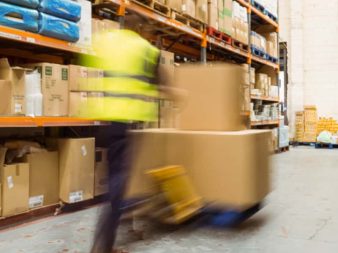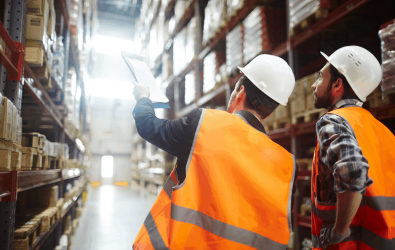E-COMMERCE FULFILLMENT / DIRECT TO CONSUMER / HAVING A DISTRIBUTION STRATEGY IS ESSENTIAL
6 Challenges Facing Manufacturers in Today's D2C E-Commerce Landscape.
What is your Direct to Consumer Distribution Strategy?
In today’s fast paced “I want it now” market, a growing number of savvy consumers are choosing to bypass brick and mortar stores in favor of an online, at-home shopping experience. If you are contemplating the jump into online retailing and direct to consumer fulfillment, here are a few of the challenges facing manufacturers today for those who are thinking of moving their business to a direct to consumer market.
6 Challenges Facing Manufacturers in
Today's E-Commerce Landscape.
For at least two centuries, the only way to move goods to market was to build your products in factories, ship them to retailers across the country and around the world, then advertise your brand in hopes that consumers would visit these retailers to purchase your products.
In today’s fast paced “I want it now” market, things have changed. Stand-alone retailers are still a critical part of the distribution network, but a growing number of savvy consumers are choosing to bypass brick and mortar stores in favor of an online, at-home shopping experience.
For the traditional manufacturer, it is no longer a question of “online” or “in-store,” it is now simply facing the reality that a direct to consumer (D2C) program must be part of their overall marketing strategy.
That decision may be inevitable, but success in this crowded virtual marketplace is not. If you are contemplating the jump into e-commerce fulfillment and direct to consumer marketing, you have several decisions to make and questions to answer.
Here are a few of the challenges facing manufacturers today for those who are thinking of moving their business to a D2C market and have questions about e-commerce logistics.
E-Commerce Logistics | Direct to Consumer and your Brand
Where do your goods fit in this marketplace?
Getting your e-commerce logistics and product distribution right is crucial to the success of your business. Some products fit the direct to consumer business model better than others. Items that are stylish, competitively priced and easy to ship products tend to make the transition more easily. Contemporary styling seems to fit the online market better than traditional, primarily since they often utilize KD (Knock-Down) or RTA (Ready to Assemble) construction which is usually lighter and requires less packaging. However, almost any product can succeed as long as there is brand awareness and eye appeal.
The key factor is to build a solid relationship with a logistics specialist who can help guide you, analyze your product or business concept, then help you prepare a solid distribution strategy.
E-Commerce Fulfillment | Determining Total Cost of Product
Where do your price points need to be to succeed?
When it comes to e-commerce fulfillment, there is no “magic number” for your product. Obviously, your merchandise must be competitive with comparable products online, but the key is to control freight charges. Today, virtually all successful online products are priced with the shipping costs included, so developing a solid contractual relationship with your shipper is essential.
A skilled logistics specialist can save you time and money.
An experienced logistics specialist knows the ins and outs of our shipping industry, they know the best way to get something from point A to point B and they know the most cost effective way to do it. Utilizing their knowledge and insight could prove invaluable and save you time and money.
Your Distribution Channel | Having the right E-Commerce Logistics Strategy Can Make the Difference
How will this affect your existing retail network?
Your e-commerce logistics strategy will very likely be different from your approach to retail sales. Obviously, traditional brick & mortar retailers dislike going head- to-head with their own suppliers on the same products, although the constant pressure of online competition seems to be an accepted reality. However, there are several strategies that you can employ to minimize this conflict. Among these are developing separate lines for the two markets, offering the same goods in different finishes or simply assigning different model numbers or names to reduce price matching.
Partnering with a D2C logistics specialist can be a huge help in developing helpful distribution strategies.
Have the Right Distribution Strategy | Your Blueprint for Safe and Secure Delivery
How will this affect your packaging and shipping?
Packaging for direct sales can be quite different than retail deliveries. Most likely, the shipment will be handled by more than one shipper and it will almost certainly be a rush delivery, which may entail excessive handling. Furthermore, the consumer will thoroughly inspect the goods upon delivery and expect pristine condition of every item they receive.
Unlike the typical retailer, the consumer will not be equipped, nor inclined, to make minor corrections to blemishes or undertake minor repairs. Instead, they will demand immediate return and replacement of their order, a process that will almost certainly gobble up all profit you made on the sale. Packaging must be designed for rough handling, dock transfers, and rush delivery by a “last mile” logistics specialist under extreme deadline pressure. A logistics specialist can examine your existing cartons and make valuable cost saving suggestions for your distribution channel.

An Experienced Distribution Partner Will Save You Money
How will shipping affect your final cost of goods?
Today’s online marketplace is an “Everything ships free!” environment. Of course, we all know nothing is “free,” but to succeed in this crowded virtual retail space, it is essential that you include the freight charges in every shipment, regardless of how far it has to go! This is a totally different world that may seem foreign to many manufacturers (especially home furnishings), but it is nonetheless a reality that must be faced. The key to D2C success is to develop contracts with knowledgeable and experienced third party logistics companies that hold to the same “anywhere goes free” concept that faces you.
But you are a single player in a field of giants where not only does the “squeaky wheel gets the grease,” but where the “BIG squeaky wheel gets most of the grease.”
The best leverage you can apply is to align yourself with the same distribution partners that are fulfilling these commitments for the companies with whom you are competing. They know the numbers….they know how to make it work. This doesn’t have to be a “go it alone” business and a professional logistics specialist can be advantageous to your distribution channel.




Direct to Consumer Success Requires a Great Customer Experience
How Do You Provide Customer Service?
For most traditional manufacturers, “Customer Service” has always meant having someone answer a call from a retailer who would ask “Where’s my shipment?” at which point you called the shipper, tracked the goods and determined their likely arrival before calling the retailer with the updated information.
In the online retail world, the phone call is from a consumer who wants their shipment TODAY and doesn’t want an excuse or a revised delivery date. Same goes for scratches, dents, knicks or missing hardware.
To prepare your customer service department for a substantial increase in call volume, you should plan on increasing staff by at least 300%, along with substantial upgrades in order processing and tracking software.
To decrease the stress of this sudden change in procedure and personnel, it would benefit you to engage a distribution partner that is familiar with D2C, can shoulder a good part of this load and advise you on how to transition into this environment with a minimum of upheaval to your existing set-up.
